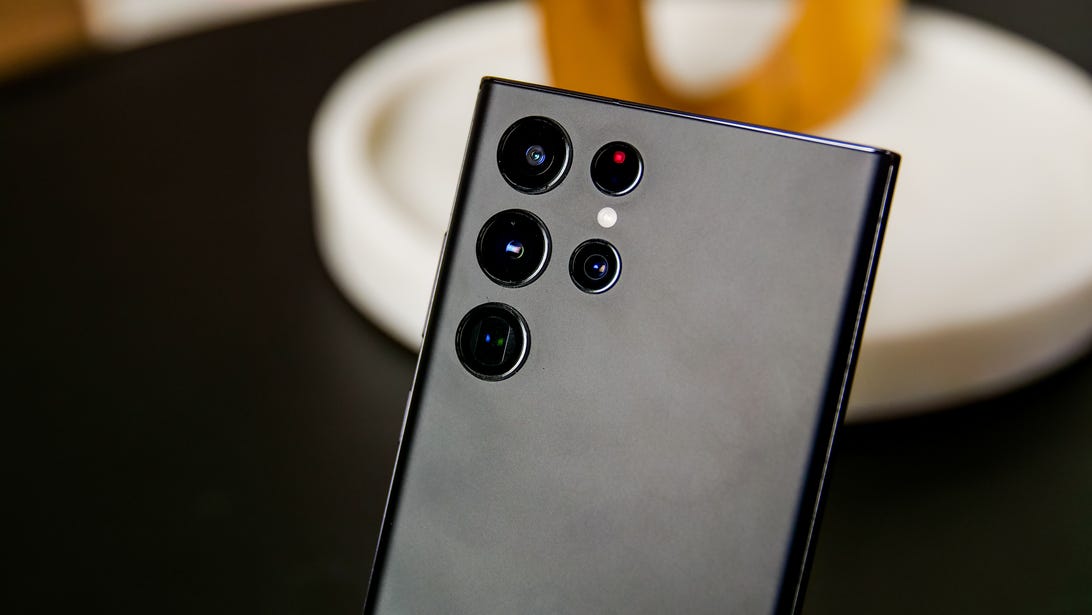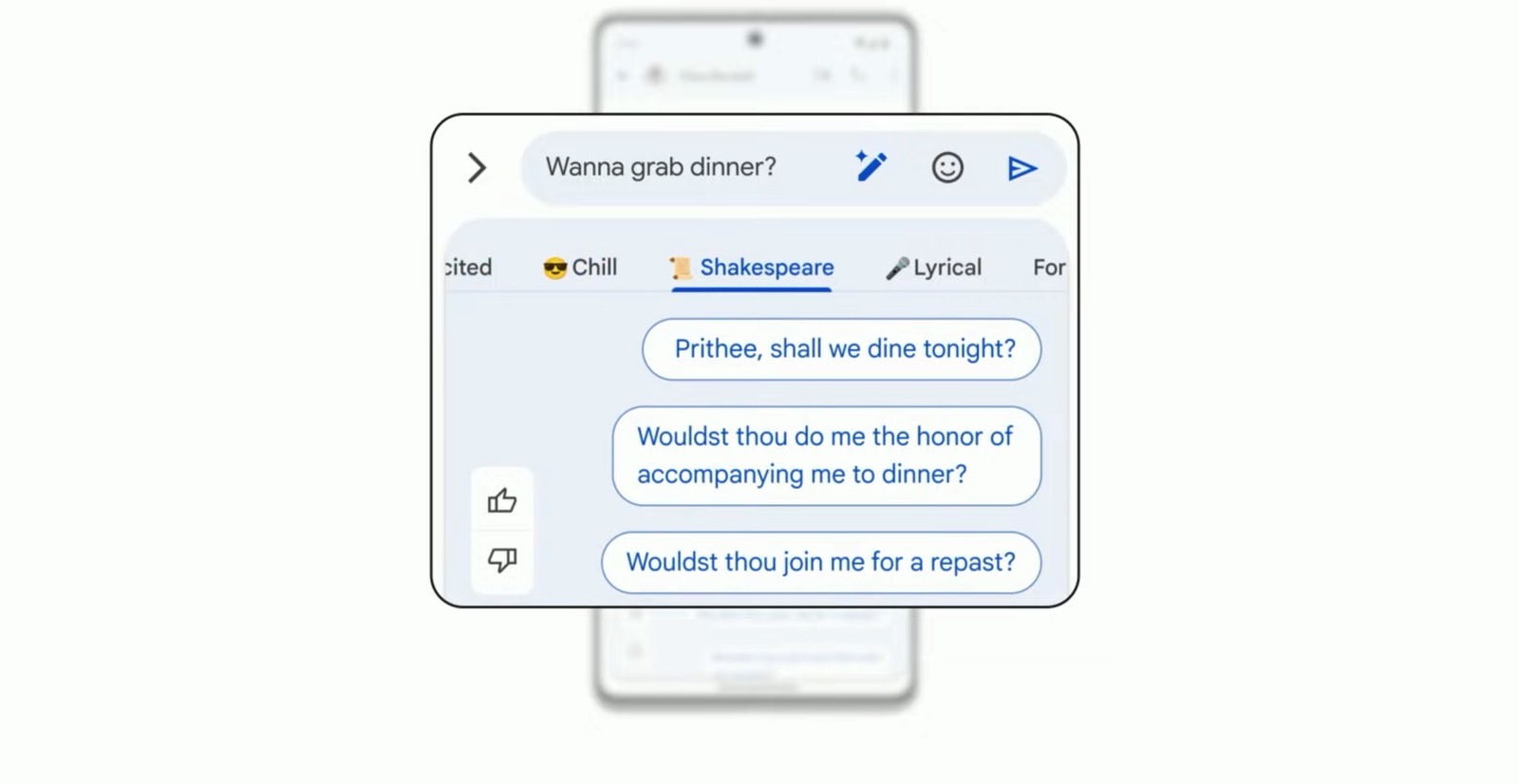Samsung's most expensive nonfoldable phone is taking a lesson from the company's past. The Galaxy S22 Ultra, announced on Wednesday alongside the Galaxy S22, S22 Plus and the Galaxy Tab S8 effectively replaces the Galaxy Note in Samsung's lineup. The Galaxy S22 Ultra starts at $1,200 (£1,149, approx. AU$2,170) and launches on Feb. 25, with preorders live now.
The Galaxy S22 Ultra is the first Samsung phone since the Galaxy Note 20 to not only incorporate S Pen support, like the Galaxy S21 Ultra and Z Fold 3, but also include a physical slot on the phone for stowing the stylus. S Pen fans who bought last year's Galaxy S21 Ultra had to buy the stylus separately and opt for a specific phone case that could store it. Other upgrades to the phone are more iterative, including steps forward in the processor, camera and screen.
Samsung declined to comment on future products when asked if it would release new Galaxy Note phones in the future. But it did say the company is now thinking of the Galaxy Note as an "experience" more than a product line, and it plans to point Note fans toward the Galaxy S22 Ultra in future.
The Galaxy Note, which debuted more than a decade ago, was an industry disrupter. It popularized bigger screens, and Samsung further distinguished the line with exclusive features that were missing from other Galaxy phones.
But the Note's place has become less clear. In 2020, Samsung squeezed the Note lineup in between the Galaxy S20 and S20 Ultra. The Note line skipped 2021 entirely. Now, the Galaxy S22 Ultra represents what appears to be a much-needed merging of the Note and the Ultra.
A more Note-like experience on the Galaxy S22 Ultra

The Galaxy S22 Ultra looks like a full Galaxy Note replacement.
Richard Peterson/CNETIn addition to full S Pen support and a spot inside the phone to store it, Samsung also made some improvements to the way its stylus works. The latency is lower, and it can transcribe handwritten notes to text in 88 languages. In the brief time I had to try the Galaxy S22 Ultra, the S Pen felt fluid and responsive, although it's hard to tell if it was any different than before.
The Galaxy S22 Ultra has also inherited the Note's more streamlined design, which has sharper edges and a more angular look compared to the standard Galaxy S phones. This gives it the more "notebook" like shape that Note fans are likely familiar with, and it could be helpful for reading and reviewing documents. The regular Galaxy S22 and Galaxy S22 Plus, which Samsung also announced on Wednesday, have a more rounded aesthetic by comparison.
This makes the S22 Ultra feel indistinguishable from the Galaxy Note, and it's a visually striking design that works well on such a large phone. It also helps the Ultra stand out from the regular S22 and S22 Plus, as it should considering the gap in price. The S22 Ultra will be available in black, white, green and burgundy.
Samsung's Galaxy Note and Galaxy S Ultra phones are known for their gigantic screens, and that's no different this time around. The Galaxy S22 Ultra's display measures 6.8 inches diagonally, just like the Galaxy S21 Ultra, and it has a QHD Plus resolution. All three new Galaxy phones can also boost their screens' refresh rate to 120Hz for smoother scrolling.
Samsung is also adding a feature it calls Vision Booster, which adjusts color and contrast based on your environment. This should make it easier to watch darker scenes in movies and TV shows. It's available on all three Galaxy S22 models, but the company says the Ultra and Plus have Samsung's brightest screens yet.
A similar camera with better night photography

The Galaxy S22 Ultra has a four-lens camera, unlike the regular Galaxy S22 and S22 Plus.
Richard Peterson/CNETThe Galaxy S22 Ultra's camera is similar to the one on the Galaxy S21 Ultra, at least on paper. There's a quadruple-lens rear camera with a 108-megapixel main sensor, 12-megapixel ultra-wide camera and two 10-megapixel telephoto lenses. The field of view on the wide and telephoto lenses is slightly wider on the Galaxy S22 Ultra compared to its predecessor.
But Samsung claims there are other upgrades that should make the device better at shooting at night and framing multiple subjects. The Galaxy S22 Ultra can detect up to 10 subjects and adjust the framing accordingly, even when new people enter the scene. That's an increase compared to the previous generation, according to Samsung.
Samsung is also emphasizing the phone's ability to take better photos and videos in the dark. All of Samsung's new Galaxy S22 phones use a process called pixel binning, which combines multiple pixels into one larger pixel to improve brightness. This process on its own isn't new to Samsung phones. But what's different is the way the S22 lineup combines pixel binning with the resolution from the phone's main camera sensor to improve both brightness and clarity, Samsung says.
Galaxy S22 photos: Get a closer look at Samsung's new phones
See all photosEven though this process works across all cameras, the Galaxy S22 Ultra should have an advantage in this department over the S22 and S22 Plus since it has a bigger 108-megapixel main sensor. The other two S22 phones each have a 50-megapixel main camera by comparison.
Portrait Mode also works at night thanks to the S22's upgraded processor, and Samsung claims the camera's new processing algorithms should improve detail too. The S22 Ultra's camera can also capture four times as much data, which should bring general image quality improvements across the board.
Read more: Photographers, the Galaxy S22 Ultra probably isn't worth your money
When shooting video, all three phones can also blend multiple exposures into a single frame to improve brightness and choose the correct frame rate automatically to optimize light.
But in terms of what really sets the Ultra apart from the standard Galaxy S22 and S22 Plus, not much has changed since last year. Many of Samsung's general picture quality improvements seem to apply to all new Galaxy models. The 108-megapixel lens, extra telephoto lens and 10x optical zoom still seem to be the biggest differentiators, which may be disappointing to anyone who was hoping to see a bigger leap like Samsung's new 200-megapixel image sensor in the S22 Ultra.
Processor and other details

The Galaxy S22 Ultra has a sharper shape with more angular edges, just like the Galaxy Note.
Richard Peterson/CNETThe Galaxy S22 lineup will run on Qualcomm's Snapdragon 8 Gen 1 chip in the US and other markets where Samsung's Exynos chip isn't available. There's a 5,000-mAh battery in the Galaxy S22 Ultra, just like the Galaxy S21 Ultra, and it supports up to 45-watt fast charging when plugged in. The starting configuration will come with 8GB of RAM and 128GB of internal storage, while the high-end model includes 12GB of RAM with 1TB of storage.
Many of these upgrades, such as faster processors and better cameras, are expected from next-generation devices. But the Ultra's new Note-like features are what distinguishes it from the rest of the S22 lineup and the broader premium phone market.
That's especially important since many advanced features that were once reserved for high-end phones -- such as multilens cameras, 5G support and screens with high refresh rates -- are now becoming the standard on moderately priced phones. As such, companies like Samsung will have to work harder to convince people to splurge on top-of-the-line devices. Now we're getting a better sense of how Samsung intends to do that on the S22 Ultra.
Check out the chart below to see how the Galaxy S22 Ultra compares to the rest of Samsung's Galaxy S22 lineup. For more, take a look at how the Galaxy S22 compares to the iPhone 13, Pixel 6, Galaxy S21 and S21 FE.
Samsung Galaxy S22 Lineup Specs
| Samsung Galaxy S22 Ultra | Samsung Galaxy S22 Plus | Samsung Galaxy S22 | |
|---|---|---|---|
| Display size, resolution | 6.8 inches; QHD+ | 6.6 inches; FHD+ | 6.1 inches; FHD+ |
| Pixel density | TBD | TBD | TBD |
| Dimensions (Millimeters) | 77.9 x 163.3 x 8.9 mm | 75.8 x 157.4 x 7.6 mm | 70.6 x 146 x 7.6 mm |
| Weight (Grams, Ounces) | 229g, 8.1oz | 196g, 6.9oz | 168g, 5.9oz |
| Mobile software | Android 12 | Android 12 | Android 12 |
| Camera | Quad camera with 108MP wide, 12MP ultra-wide, dual 10MP telephoto lenses | Triple camera with 50MP wide, 12MP ultra-wide and 10MP telephoto lens | Triple camera with 50MP wide, 12MP ultra-wide and 10MP telephoto lens |
| Front-facing camera | 40MP | 10MP | 10MP |
| Video capture | 8k at 24 FPS, 4K at 60 FPS | 8k at 24 FPS, 4K at 60 FPS | 8k at 24 FPS, 4K at 60 FPS |
| Processor | Qualcomm Snapdragon 8 Gen 1 | Qualcomm Snapdragon 8 Gen 1 | Qualcomm Snapdragon 8 Gen 1 |
| RAM/Storage | 8GB RAM with 128GB internal storage 12GB RAM with 256GB internal storage 12GB RAM with 512GB internal storage 12GB RAM with 1TB internal storage | 8GB RAM with 128GB internal storage 8GB RAM with 256GB internal storage | 8GB RAM with 128GB internal storage 8GB RAM with 256GB internal storage |
| Expandable storage | None | None | None |
| Battery/Charger | 5,000 mAh with up to 45W wired charging and 15W wireless charging | 4,500 mAh with up to 45W wired charging and 15W wireless charging | 3,700 mAh with 25W wired charging and 15W wireless charging |
| Fingerprint sensor | Yes, ultrasonic | Yes, ultrasonic | Yes, ultrasonic |
| Connector | USB-C | USB-C | USB-C |
| Headphone jack | None | None | None |
| Special features | S Pen included, quad camera, ultra wideband location detection tech, 120Hz refresh rate screen | Triple camera, ultra wideband location detection tech, 120Hz refresh rate screen | Triple camera, 120Hz refresh rate screen |
| Price off-contract (USD) | $1,200 | $1,000 | $800 |
| Price (GBP) | £1,149 | £949 | £769 |
| Price (AUD) | AU$2,170 (converted) | AU$1,790 (converted) | AU$1,450 (converted) |
Samsung Galaxy S22 Ultra early impressions: Say hello to the S Pen - CNET
Read More

No comments:
Post a Comment